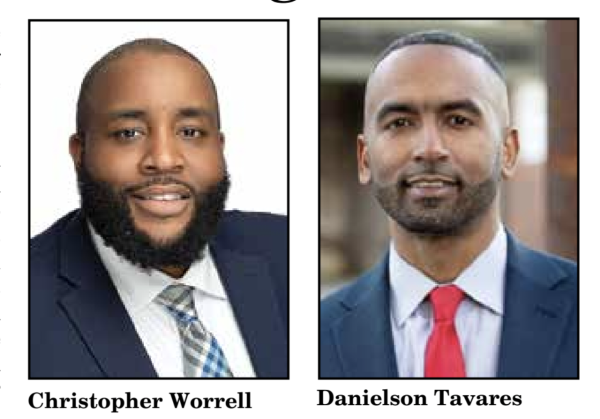July 12, 2022

Local lawmakers and unions are taking sides in the race to replace state Rep. Liz Miranda, whose House seat, anchored in Dorchester and Roxbury, is open due to her run for a state Senate seat. In the contest for her 5th Suffolk House seat, the two main candidates have also received encouragement from the current and former mayors of Boston.
Danielson Tavares and Christopher Worrell, both 36-year-old Democrats with experience working inside City Hall and the State House, jumped into the race after Miranda launched her run for the Second Suffolk Senate seat. Perennial candidate Althea Garrison is also running as a Democrat, while fellow perpetual contender Roy Owens is on the November ballot, but without a party.
There isn’t a Republican in the race, meaning the Sept. 6 primary will likely be determinative in who will be replacing Miranda in the State House come January.
Tavares and Worrell say they are well-known in the district, which includes the Bowdoin-Geneva area, Uphams Corner, Grove Hall, and Dudley Street and has a large Cape Verdean population. Both have drawn donations from the city’s business sector and city employees.
Tavares, a Cape Verde native who served as chief diversity officer under former mayor Martin Walsh, leads in fundraising, with roughly $24,000 in the bank at the end of June, $9,000 of it in cash on hand. John Barros, Walsh’s former economic development chief who ran for mayor in 2013 and 2021, is his campaign chair.
Walsh has been supportive of Tavares, though the former union leader, now serving as President Biden’s labor secretary, is limited in how much he can help in the election. During last year’s race to succeed him in City Hall, Walsh cited the Hatch Act, which restricts executive branch employees from certain political activity, in declining to publicly endorse a candidate.
Tavares has pulled in endorsements from the Massachusetts Teachers Association, the Boston Teachers Union, as well as Laborers Local 223, the union headed by a Walsh cousin. Additional union endorsements are expected. The Ward 15 Democratic Committee is also supporting Tavares.
“When I chose to engage in this race, I wanted to run on my community ties,” Tavares said. “Other candidates adopted the opposite strategy of seeking big-name endorsements.”
Worrell, whose older brother Brian is District 4’s city councillor and the 13-member body’s only Black man, has picked up support from elected leaders such as Councillors At-Large Ruthzee Louijeune and Julia Mejia, state Sen. Lydia Edwards of East Boston, and former acting mayor Kim Janey, who said she “saw firsthand” Worrell’s efforts in “raising up the voices and needs of Black and Brown residents in so many areas.”
“Endorsements are flowing from the people who know I’ve been doing the work,” candidate Worrell told the Reporter. “I was never a person to hide behind a desk. I’ve been out in the community. It’s not a readjustment or introducing myself.”
Worrell, who is set to go on leave from his job as assistant director of diversity, equity, and inclusion at the Boston Planning and Development Agency within City Hall, was encouraged to run for the House seat by Mayor Michelle Wu, Walsh’s elected successor. She has not yet formally endorsed a candidate in the race.
Through the end of June, Worrell had raised $11,659 and had just over $6,000 in cash on hand. A number of donors are from the Massachusetts Historical Society, where he worked before he took a job as an aide to state Sen. Nick Collins of South Boston. Kobie Evans, the owner of Boston’s first recreational marijuana dispensary, is a friend and donor, as well.
Tavares also has State House experience, having served as an aide to former state Rep. Carlos Henriquez. Tavares went on to work for the Walsh administration, rising through the ranks from special assistant to the mayor to deputy chief operating officer, and then in 2016, to chief diversity officer.
When he started, 37 percent of the city’s workforce were people of color, and by the end of his tenure, 60 percent of new hires were people of color, a shift that “speaks to the commitment we had on the issue,” said Tavares.
He was also involved in an effort to publicly release real-time demographic information. “There’s often a disconnect in government in terms of relaying information back to our constituents,” he said. “If folks don’t know work is happening, the impression is work isn’t happening. Elected officials should return information in real time about issues they care about.”
Both Tavares and Worrell say affordable housing, and the accompanying sense of being unable to afford to live in high-cost Boston, is the top issue they hear from voters as they knock on doors. “They’re scared of replacement, scared of gentrification, scared of just leaving families behind and going out to the suburbs of Boston, far away from where they are now,” Worrell said.
Turnout will be a key factor in the race. Miranda, a Roxbury native whose great-grandfather came to Massachusetts from Cape Verde, won the seat in 2018 In a four-way primary. She received 2,777 votes to union political organizer Darrin Howell’s 1,470 count. Roy Owens received 361 votes, and Brad Howze got 59.
Miranda went on to beat Althea Garrison in the November 2018 election, 8,527 to 1,053.
Miranda, who popped by a recent Tavares fundraiser, has not endorsed in the race to succeed her.
The 5th Suffolk district has roughly 46,000 people within its borders. Forty-five percent are Black, 29.9 percent are Hispanic, 8.46 percent are white, and 4.64 percent are Asian.


